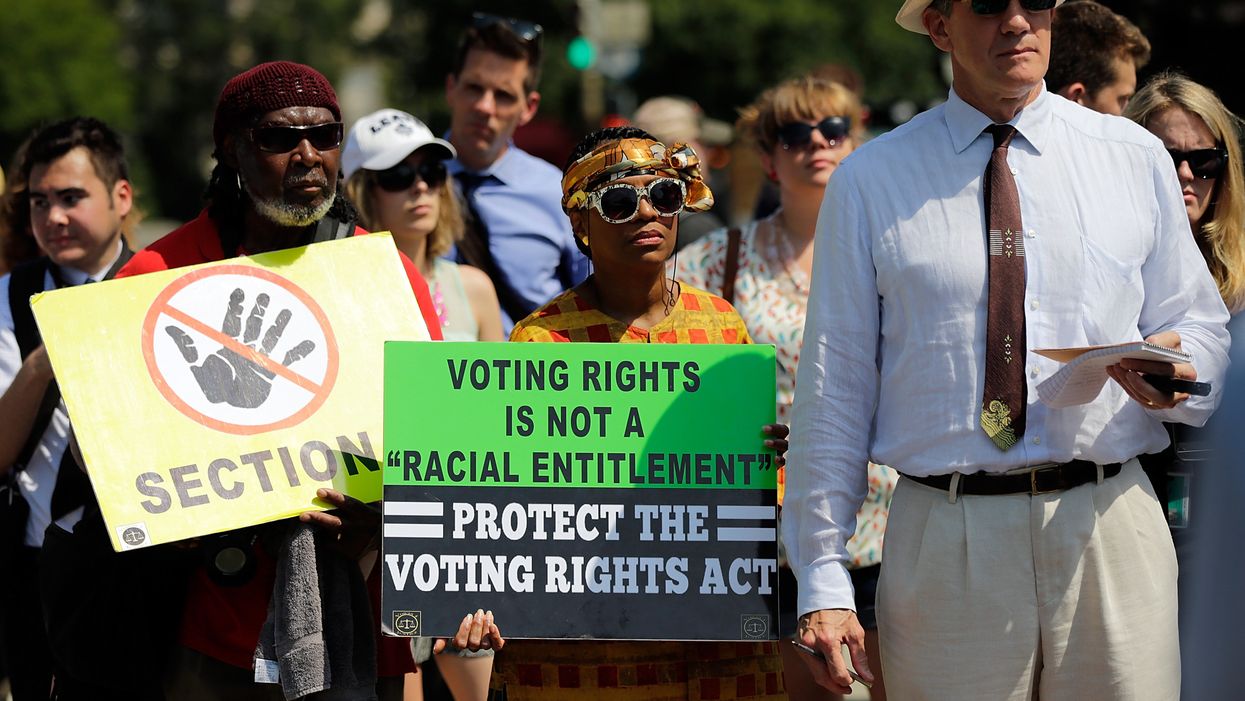Greenwood is co-director for voting rights and redistricting at the nonpartisan Campaign Legal Center. Norouzi is deputy director of OneAmerica, an immigrant and refugee advocacy organization in Washington state.
In 2013, Justice Ruth Bader Ginsburg argued that gutting provisions of the Voting Rights Act that protected communities of color from electoral discrimination was like "throwing away your umbrella in a rainstorm when you are not getting wet." Yet that is exactly what has been happening around the country as barriers have been placed in front of communities of color. Increasingly restrictive voter ID laws, polling place closures and felony disenfranchisement laws have popped up in many states.
Without the full protection of the federal Voting Rights Act, a landmark achievement of the civil rights era that was neutered by the Supreme Court seven years ago, the onus has been shifted to the states to protect communities of color from voting discrimination.
And so every state should adopt its own version of a voting rights act and other election system reforms to ensure that communities of color can gain equal access in voting and representation.
The original 1965 law vastly improved the ability of communities of color to participate in our democracy. Much of this success came from the fact that it required preclearance, which meant that states and localities with long histories of suppressing voters of color needed to gain approval from the federal government before instituting new voting rules. Soon after the law's enactment, the number of registered voters of color skyrocketed. In the seven states originally subject to preclearance, the number of registered Black voters ballooned from less than a million in 1965 to nearly 3.6 million in 1986. Additionally, with communities of color able to elect their preferred candidates, more elected officials of color started serving in state and local governments.
But even though the Supreme Court has gutted the federal law, states can write their own statutes to ensure communities of color make strides in ballot access and representation. Nearly 200 jurisdictions have seen changes to their electoral systems to better protect the voting rights of people of color in the roughly 20 years since the enactment of the California Voting Rights Act.
The version of the law enacted in Washington state goes beyond California's protections, in particular by explicitly allowing jurisdictions to adopt electoral systems other than single-member districts. This includes ranked-choice voting, which can better enfranchise communities of color that are spread out across a jurisdiction. Under this alternative election system, voters may rank candidates for each office in order of preference. If one is the first choice of most voters, that candidate wins. If not, the candidate in the top spot on the fewest ballots is eliminated, and those ballots are redistributed to the candidates named as second choice. This process continues until someone has more than half of the vote.
Latinx activists are pushing rural Yakima County, 140 miles southeast of Seattle, to adopt RCV. The county commission uses an at-large voting system whereby all the commissioners can get elected by the white plurality — leaving Latinx and Native American voters unable to elect their candidates of choice. Even though half of Yakima County is Latinx, only one Latinx person has ever been elected to the commission.
In January, our two organizations sent a letter on behalf of the activists, putting the county on notice its system was denying the Latinx community "an equal opportunity to elect candidates of their choice." Since Yakima County has failed to respond by engaging the community in creating a solution, we sued the county this week for violating the Washington Voting Rights Act. The growing non-white community deserves equal representation and to have their voices heard.
Ranked-choice elections have the potential to uplift communities of color elsewhere too. They fundamentally encourage candidates to reach out to a more diverse pool of voters and prevent candidates from relying on narrow white majorities to propel them to victory. The RCV advocacy group FairVote, which studied two decades of elections in California cities, found that the share of candidates of color grew to 26 percent from 17 percent in the municipalities with RCV — and slipped by a point, to 11 percent, in places with traditional elections.
Sometimes, creating one or more electoral districts with a non-white majority can remedy political discrimination and allow communities of color to choose their preferred candidates. But often these communities are dispersed across several neighborhoods and cannot be packed into one district in a way that maximizes their electoral power. In these jurisdictions, RCV would be the strongest option for allowing everyone to participate equally in the governing process — because it can take varying levels of racial segregation into account.
However, equitable representation relies on states having voting rights laws that allow them to force jurisdictions with long histories of voting discrimination to change their election systems. Only Oregon along with California and Washington have their own such laws on the books now, although such a measure is making its way through the New York Legislature. The other 46 states should follow suit.
State voting rights laws would not only protect communities left to face voting discrimination in place of a federal law that's hardly in full effect, they would also improve on the original Voting Rights Act by creating better mechanisms for addressing local instances of voting discrimination.
For the past seven years, communities of color may have been without umbrellas as they try to weather the storm of voting discrimination. The states could step in and give them better protection than ever.



















